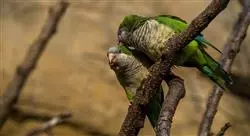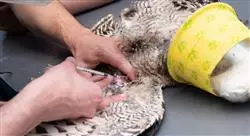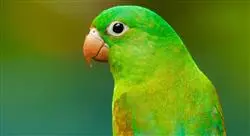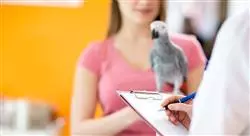University certificate
The world's largest faculty of veterinary medicine”
Description
Avian patients have specific pathologies for which specialized veterinary professionals are needed”
Veterinarians face great professional challenges in their daily practice to improve the health of their patients, especially when dealing with avian species, since the study of these animals is not carried out in as much depth as that of domestic animals, for example. This Postgraduate Diploma in Maintenance, Nutritional Requirements and Diagnostic Techniques in Birds has been designed by a team of professionals of the highest academic level, who have injected all their knowledge in the field to train veterinarians.
In the case of avian patients, veterinarians must know their physiognomy and anatomy, including the morphological variations of each species of bird. Thus, physical examination is a fundamental part of the diagnosis of avian disorders and it involves handling and holding the bird in order to carry out the necessary explorations to care for it. However, even before taking a bird for handling, there are some very important prerequisites to consider.
This Postgraduate Diploma also deals in depth with captive birds, which depend on the care provided to them for food, shelter and security, hence the importance of understanding the nutritional requirements of each species, existing types of nutrition and developing the appropriate diets for each of them.
Finally, an important part of this training is the study of diagnostic techniques in birds to advance scientific evidence and knowledge, optimizing economic resources and time spent for early treatment.
In routine clinical practice, complementary diagnostic techniques are usually used, many of them based on image diagnosis, such as radiology, endoscopy and ultrasound, without going further into the rest of the available and necessary tests.
In short, this training provides students with specific tools and skills to successfully develop their professional activity in the wide field of avian medicine and surgery. It addresses key competencies such as knowledge of the reality and daily practice of the veterinary professional, and develops responsibility in the monitoring and supervision of their work, as well as communication skills within the essential teamwork.
As it is an online Postgraduate Diploma, students are not constrained by fixed timetables or the need to commute to a physical location, but can access the contents at any time of the day, balancing their work or personal life with their academic life.
Do not miss the opportunity to study this Postgraduate Diploma with us. It’s the perfect opportunity to advance your career”
This postgraduate diploma in Maintenance, Nutritional Requirements and Diagnostic Techniques in Birds contains the most complete and up-to-date educational program on the market. The most important features of the program include:
- Practical cases presented by experts in avian medicine
- The graphic, schematic, and eminently practical contents with which they are created, provide scientific and practical information on the disciplines that are essential for professional practice
- Latest developments in maintenance, nutritional requirements and diagnostic techniques in birds
- Practical exercises where the self-assessment process can be carried out to improve learning
- Special emphasis on innovative methodologies in avian medicine
- Theoretical lessons, questions to the expert, debate forums on controversial topics, and individual reflection assignments
- Content that is accessible from any fixed or portable device with an Internet connection
This postgraduate diploma is the best investment you can make when choosing a refresher program to expand your existing knowledge of the subject matter”
IIts teaching staff includes professionals from the veterinary field, who bring the experience of their work to this training, as well as recognized specialists from leading societies and prestigious universities.
The multimedia content, developed with the latest educational technology, will provide the professional with situated and contextual learning, i.e., a simulated environment that will provide immersive training programmed to train in real situations.
The design of this program focuses on Problem-Based Learning, by means of which the specialist must try to solve the different professional practice situations that arise throughout the postgraduate diploma. For this purpose, the professional will be assisted by an innovative interactive video system created by renowned and experienced experts in Maintenance, Nutritional Requirements and Diagnostic Techniques in Birds with extensive experience.
This program comes with the best didactic material, providing you with a contextual approach that will facilitate your learning"
This 100% online postgraduate diploma will allow you toa balance your studies with your professional work while expanding your knowledge in the field"
Objectives
The postgraduate diploma in Maintenance, Nutritional Requirements and Diagnostic Techniques in Birds is designed to facilitate the performance of veterinary professionals with the latest advances and most innovative procedures in the sector.
This is the best option to learn about the latest advances in bird medicine and surgery”
General Objectives
- Identify the differences between birds and mammals
- Ascertain the most characteristic property in avian patients: The capacity for flight
- Analyze variations between species based on avian anatomy and physiology
- Specify key anatomical points to select diagnostic techniques
- Establish the necessary requirements for keeping birds in captivity
- Examine the key criteria for health, welfare and success in avian
- Determine nutritional guidelines and specific diets for birds
- Generate guidelines for all birds, including birds of prey and others less clinically studied species such as pigeons
- Compile the most commonly used diagnostic techniques: radiology, endoscopy and ultrasound
- Develop specialized knowledge in all laboratory diagnostic tests
- Establish the protocols to interrupt biochemical analysis and proteinograms
- Demonstrate the correct necropsy technique in avian patients
- Generate protocols for coprology in birds
- Examine radiology techniques in avian patients
- Anticipate diagnostic difficulties in ultrasound in avian patients
- Propose endoscopy as the diagnostic technique of choice
Specific Objectives
Module 1. Avian Taxonomy, Anatomy and Physiology
- Substantiate the taxonomic classification according to each order
- Examine the skeletal system, anatomical memory of each location
- Identify the common breeds of chickens and hens kept as pets
- Evaluate blood composition and the circulatory system
- Develop the basis of respiratory functioning to advance knowledge of anesthesia and emergency treatment
- Compile all current information on the anatomy and physiology of the digestive system
- Detail the forgotten areas of the sense organs and their fundamental implication in patient recovery
- Collect all the information on the lymphoid organs, especially the characteristic bursa of Fabricius and other glands of interest
Module 2. Clinical Criteria for Avian Patients
- Propose the challenges of keeping poultry and other avian species
- Examine the difficulty of bird scouting
- Determine the requirements for keeping birds in captivity
- Analyze the most relevant clinical characteristics and their importance in physical examination to reach appropriate diagnoses and treatments
- Develop specialized knowledge on capture and adequate containment of avian patients
- Establish the main routes of drug administration
- Exhaustively analyze the nutritional requirements, types of nutrition and elaborate diets for each species kept in captivity
Module 3. Laboratory Tests
- Analyze diagnostic evidence, information gathering methods, sample preparation for referral and transport purposes to anatomic pathology laboratories
- Examine hematology in birds with the different morphological changes they present
- Identify the results of biochemical analyses in birds
- Develop the latest cytological techniques
- Demonstrate the correct technique for sending samples to anatomic pathology services
- Examine the external and internal lesions that birds may present in the postmortem technique and their diagnostic interpretation
- Obtain the necessary samples from the postmortem examination for study by histopathology, microbiology and polymerase chain reaction (PCR)
Module 4. Diagnostic Imaging Techniques
- Specify the sedation and anesthesia techniques necessary to perform diagnostic imaging techniques
- Study existing radiology equipment and diagnostic options in birds
- Develop management techniques for proper patient positioning, including the most commonly used projections in daily clinical practice
- Analyze the anatomical references in radiography, ultrasound and endoscopy to reach reliable diagnoses
- Justify why a specific type of ultrasound probe is used in avian patients
- Analyze the endoscopy techniques and applications in birds
- Achieve the maximum knowledge in other really important diagnostic techniques such as routine coprological analysis
A unique specialization program that will allow you to acquire advanced training in this field"
Postgraduate Diploma in Poultry Maintenance, Nutritional Requirements and Diagnostic Techniques
If you have a passion for poultry care and want to become an expert in poultry maintenance, nutritional requirements and diagnostic techniques, TECH Global University's Postgraduate Diploma is the ideal program for you. For 6 months, our online classes will provide you with the knowledge and skills necessary to excel in this specialized field. We pride ourselves in offering high quality academic programs that are tailored to the needs of professionals. Our educational program is delivered in an online format, allowing you to study from anywhere and at your own pace. You will immerse yourself in the fascinating world of birds and learn about their proper maintenance, specific nutritional requirements and diagnostic techniques used in their care. Our team of experts will guide you through interactive lectures, real-world case studies and hands-on activities to give you a thorough understanding of these key areas.
Acquire specialized knowledge in poultry maintenance, nutrition and diagnostics.
During the program, you will learn how to design and maintain a suitable environment for birds, provide them with a balanced diet and assess their health status using advanced diagnostic techniques. Our approach will allow you to develop field-applicable skills, giving you a solid foundation for working in the care and management of birds in different environments, such as zoos, nature reserves or rescue centers. At the end of the program, you will be prepared to meet the challenges of bird care and contribute to the well-being of birds in any environment. You will earn a certificate, backed by our reputation as a leading institution in higher education. Don't miss the opportunity to become an expert in bird care. Enroll and take the first step towards a successful career in this exciting field - your passion for birds can become a rewarding and enriching profession!











